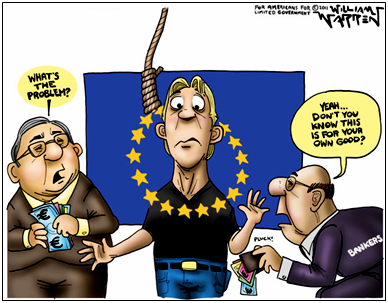
In Cyprus, to avert a bank run by citizens furious over a bank bailout financed by confiscating citizen deposits, with banks reopening for the first time in two weeks, withdrawals from banks are being limited to €300 ($383) a day per person.
And yet, domestic, electronic credit and debit card transactions will be welcome.
Again, Cypriots will be unable to get all of their cash at once, but so long as they conduct their purchases electronically, then no problem.
So, the money is not there in the banks for withdrawal, but it is — kind of, sort of.
Welcome to the world of digital currency in fractional reserve banking, where bank solvency can be guaranteed with a few mouse clicks by a central banker, or through the implementation of capital controls that deprive citizens the right to actually get a hold of their own money.
All that is left of the wealth of the people of Cyprus are digits on a computer screen.
That no bank could ever honor all of its deposits at once is a well known fact of life, and yet there Cypriots stand in line at ATMs like they were waiting for a new Star Wars premiere.
Faith in the financial system in Cyprus has been shattered, perhaps irreparably.
Nicolas Veron, a senior fellow at Bruegel in Brussels suggests that the capital controls may not be temporary: “It could turn out like Iceland, extending to many years.”
Except, unlike Iceland, Cyprus does not have control over its own currency. It therefore has all of the disadvantages of a regime of financial repression — but none of the advantages of its own currency to begin to repair its financial system.
Instead, all assistance will have to come from the Troika — European Commission, European Central Bank, and the International Monetary Fund — which right now is throwing the government of Cyprus a €10.7 billion ($13.66 billion) loan.
In Iceland in 2008, when the banks there failed, the government there allowed those institutions to fail, and guaranteed the deposits of its citizens. In Cyprus, by contrast, the banks are essentially being saved, and citizen depositors with more than €100,000 ($127,750) in savings are shouldering the burden at a rate as high as 30 to 40 percent of all their wealth.
Iceland also engaged in devaluation to soften the blow of massive defaults throughout its economy as its own housing bubble popped. Cyprus will be unable to do that, although it would have undoubtedly been better off doing so and leaving the Eurozone. At least then deposits could have been guaranteed in Cypriot pounds.
Instead, Cyprus is the sacrificial lamb that will be slaughtered to save the Eurozone from imploding. Like the Hotel California, sovereigns can check out any time they’d like, but they can never leave.
In the meantime, €10.7 billion will likely not be enough to shore up an economic downturn in Cyprus, which should now expect to see a sharp rise in unemployment now. Cascading joblessness will in turn lead to more defaults on loans, fracturing an already fractured financial system there.
One way or another, bank capital may be systematically wiped out to resolve these imbalances, and the government there may find itself back to the bailout window within weeks or months.
In the meantime, this whole episode stands as a stark warning to free peoples the world over that have outsourced monetary and financial policymaking to financial institutions that make it “easier” to bank with them through electronic transactions.
Are we actually sacrificing private property rights and our retirement savings in exchange for convenience?
In the U.S., our central bank readily prints money to shore up liquidity or solvency issues within the banks — essentially privatizing profits but socializing losses. Across the pond, now we see the opposite side of the coin when those losses are imposed on average citizens who bore no guilt in the financial mess the country finds itself in.
In Cyprus, banks took losses lending money to the socialist government of Greece. Now, depositors who did not even make the loans must shoulder the losses, and the wider economy must be destroyed, all to prop up a broken house of cards system that never made any sense in the first place
Really, this is a seminal moment in history and a direct threat to depositors everywhere. Either, we allow the money to be printed freely and forever by central banks to prop up the financial system in bad times and feed the bottom lines of the privileged few in good times, or they’ll crash the economy and wipe out our savings.
Sound like blackmail? Because that’s what it is.
Robert Romano is the Senior Editor of Americans for Limited Government.







